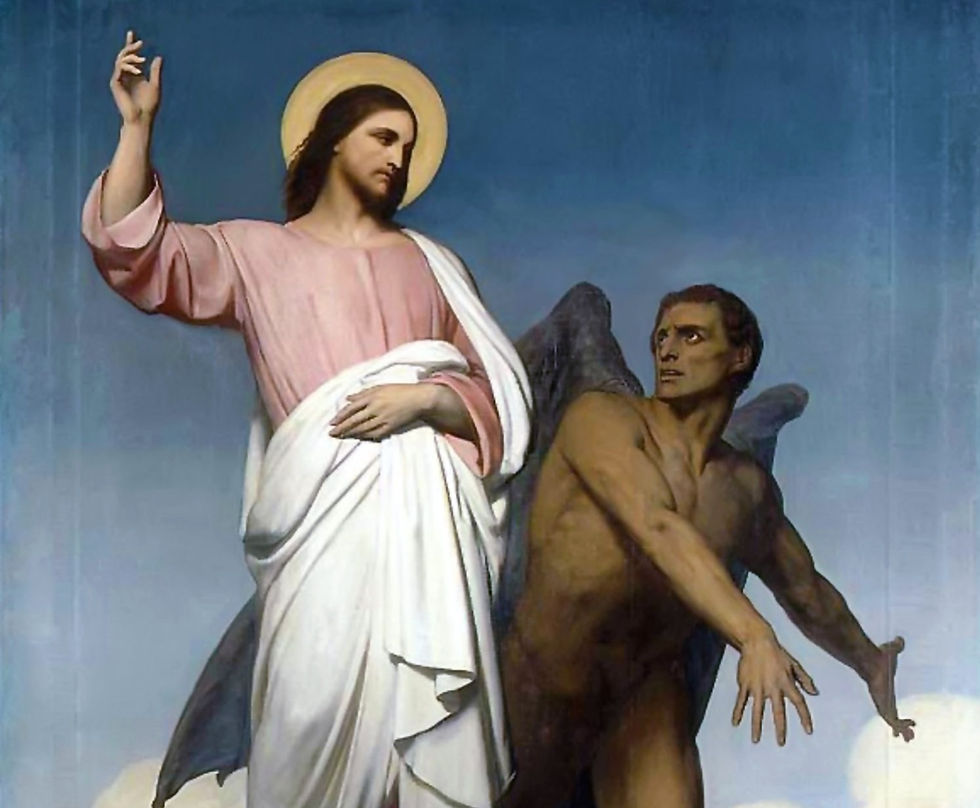Tragedy in Paradise & Victory in Wilderness
- Charles
- 25 févr. 2023
- 4 min de lecture
Reflections for the First Sunday of Lent (Genesis 2:7-9; 3:1-7; Romans 5:12-19 & Matthew 4:1-11)
This first week of Lent, the liturgy proposes two stories of temptation for our reflection. While the first reading narrates the tragedy of the fall of our first parents (Adam and Eve), the Gospel recounts the victory of Jesus over the tempter. Ironically, these two stories are set in contrasting settings: the tragedy of sin’s entry into the world occurs in the abundance of the Garden of Eden, while Jesus’ victory over sin and death is set in the scarcity of a wilderness.

Three interesting themes evolve from a parallel reading of these two temptation stories:
1. The ‘reality’ of temptation: The tempter plays a key role in both these stories. In Genesis, he takes the form of a serpent, “the most cunning of all animals that the Lord had made”. In Matthew, he approaches Jesus without masks or disguises. What is intriguing, however, is that like our first parents, Jesus faced the snares of the tempter. Hebrews 4:15 claims, he was “tempted in every respect as we are, yet without sin”. The reality of temptation is part of being human and Jesus, as true God and true man, participates in this reality. Temptation is a battle we all have to wage. As Pope Leo, the Great said, “Virtue is nothing without the trial of temptation, for there is no conflict without an enemy, no victory without strife”.

We often misunderstand original sin as some sort of a spiritual disease that we inherit via our genetics (DNA and chromosomes). While the Church’s understanding of original sin is characteristically different and more meaningful: “It is a deprivation of original holiness and justice, but human nature has not been totally corrupted: it is wounded in the natural powers proper to it; subject to ignorance, suffering, and the dominion of death; and inclined to sin - an inclination to evil that is called “concupiscence” (Catechism of the Catholic Church, no398). The Church insists that concupiscence (meaning Inclination/vulnerability to sin) “comes from sin and induces to sin” but it is not itself sin.
2. The value of our ‘choices’: There are striking similarities between the two temptation stories. Both the temptation stories involve gratification: while eve finds the forbidden fruit “good for food”, Jesus resists the temptation to gratify his hunger by changing stones into food. Both stories invoke the temptation of self-idolatry: while Eve is told that they will become “like gods”, Jesus is tempted to prove His divine sonship by throwing himself down the parapet of the temple. Both stories invoke the temptation of pride: while the serpent tricks Eve into believing that she will not die (in stark contrast to God’s caution: “in the day that you eat of it you shall die”), the tempter makes an empty promise to Jesus that he would give him the kingdoms of the world if he worshipped him.

While the temptations of self-gratification, self-idolatry, and pride are common to both stories, the way they are dealt with by the protagonists makes all the difference. Adam and Eve fall for the tempter’s trick while Jesus calls out his bluff. While all three had free will, the freedom and ability to make a free choice in the face of temptations, only Jesus makes the right choices! “We are our choices”, claims Jean-Paul Sartre. Life presents us with innumerable possibilities, options, and choices. It is these decisions that shape what we become. Inclined to sin, as we are, here is a liberating truth: our choices matter! Yes, we are born in a state of sin but we are not eternally doomed by it! Our free and willing choice to cooperate with God’s grace helps us restore our holiness and justice.
3. Alienation vs Reconciliation: It is interesting to note the immediate effect of the fall in the first reading and that of Jesus’ victory in the Gospel. The fall results in a four-fold alienation.
i. Alienation from God: When God enters the Garden of Eve, what did our first parents do? They sought to hide.
ii. Alienation from themselves: When their eyes were opened, they realize they are naked and that their nakedness is counted as something to be ashamed of.
iii. Alienation from each other: When Adam is asked why he ate the forbidden fruit, he immediately blames Eve, whom he had earlier described as “bone of his bones and flesh of his flesh”.
iv. Alienation from nature: When it was Eve’s turn to face God, she passes the buck to the serpent. Sin alienates us from God, oneself, others, and nature.

The victory of Jesus, on the other hand, leads him to ‘closeness’ in all these aspects. Matthew’s episode of the temptation of Jesus is immediately followed by the beginning of His ministry in Galilee. Jesus’ ministry of reconciliation shall bring humanity closer to God, to each other and to the entire creation. Jesus takes upon himself the yoke of alienation, bringing about true and lasting reconciliation. C.S. Lewis wrote, “The world is a dance, in which good, descending from God, is disturbed by evil arising from the creatures, and the resulting conflict is resolved by God’s own assumption of the suffering nature which evil produces” (The Problem of Pain, 1940, p.80). In our own personal stories of temptations, let us make responsible choices that will transform us into ministers of reconciliation.




Commentaires